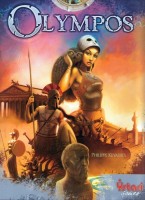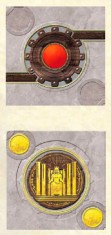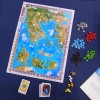
Olympos
3-5
13+
75


Game Description
At the dawn of civilization, take the destiny of a whole people into your hands.
In front of you, the plains of the Peloponnese stretch out. In the distance, the bright shores of the mythical Atlantis. However, in order to create a stable environment in this promised land, you will need to defeat your enemies, develop technologies, build wonders, and above all pray for the clemency of the gods who watch your every action from on high in their abode on Olympos!

Olympos Map Click to Enlarge

images © Ystari Games
User Reviews (1)
Add a Review for "Olympos"
You must be logged in to add a review.

Olympos sees you as warring Greek tribes looking to control various regions on a map, which in turn control resources that allow you to purchase developments, which give you both victory points and additional bonuses to both gameplay and end scoring. On a player’s turn they can either place and move a unit into a territory, or take a development if they have the required number of resources.
Primary in what makes Olympos stand out is the time track mechanic (which can also be found in Red November and Thebes, and to a certain extent Glen More). Different actions take different amount of time which move you forward on the track: regional movement is only limited by how much time you want to spend zipping around the map, while taking a development costs a base 7 time units less any from previous bonuses. Like Red November, the person who’s farthest behind on the time track is next in line to play, so balancing how much time you take so you don’t get short-shrifted in turn order is paramount.
The reason being there’s a hard limit on how much time you can spend: The game ends once every player reaches the home stretch of the time track (where they can either stop where they are for points or take one last Hail-Mary turn if they’re close to completing something). Unlike Glen More, where there’s a catch-up mechanic in place for those who took less turns, there’s a very real sense that every minute you spend on one task is time you can’t spend elsewhere. And while there are extra time tokens that let you move and spend without advancing your token on the track, being careful about what you pursue will prove beneficial, because you also have to deal with the other players.
This leads to the very interesting battle mechanic, where players can take over regions controlled by others simply by marching in. The aggressor always wins but, depending on how balanced or imbalanced each player’s military strength is, pays a little or a lot of time for their victory. The loser also gets an extra time token as consolation, and can (if they like) turn right around and re-conquer their lost territory the next chance they get.
However, as this is very time consuming in a game where you need all the time you can get (so to speak), such tit-for-tat game play is largely to no-one’s benefit. Balancing the need for certain resources with how scarce they are and who else wants them (they are hard coded to certain regions and can only be controlled by one player at a time) is a large part of game play, along with picking and timing your battles (or avoiding them all together in favor of exploration).
The one problem I have with Olympos is that, with a higher player count, play becomes highly opportunistic and tactical. And in a game where crafting the best set of logistics to get what are already very tight resources, crowding up the board with more players makes for a less fun and more frustrating experience. In this vein, the game plays best with 3-4, where there’s just enough players to get in the way, but not enough such that you can’t attempt a long-term strategy.
Family gamers may be a bit confused with Olympos, not so much for its complexity as it’s wealth of options and moving parts, while Social and casual gamers may find a fun challenge with enough random events to make it enjoyable in a fairly quick package. Avid and Power gamers may be initially put off by the potential chaos of high-player-count games, but may enjoy the crunch that emerges from the time mechanics. In short, Olympos is a neat little light civilization game with some clever mechanisms, and deserves a look.